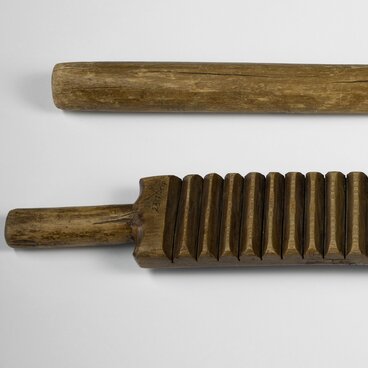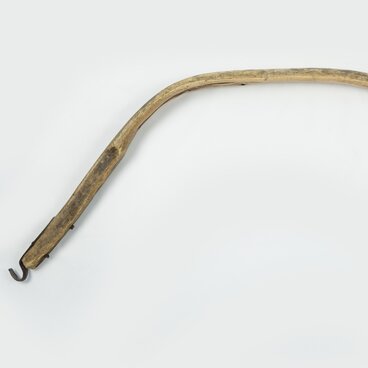This metal box was kept for a long time among forgotten things at the Glazov railway station, and then was transferred to the Glazov Museum of Local Lore. In the 19th century, travelers transported mail correspondence and money or valuable documents in such boxes, or safes. A box remained in the post office until the recipient came for the important parcel.
The box was made of thick and heavy metal sheet and was fitted with an internal lock, which is now missing. A convenient handle was attached to the lid of the box, and inside it was painted in bright red. From the outside, the item resembles a wooden box, and on the inside of the lid is a stenciled inscription “V. Zhukovsky. S.P.B.”, which engendered a legend about its owner.
It was assumed that this portable safe for mail belonged to Vasily Andreyevich Zhukovsky, a Russian poet and mentor of the future Emperor Alexander II. In 1837, Vasily Zhukovsky accompanied the 19-year-old Tsarevich Alexander Nikolayevich on a big trip across the Russian Empire. Such a trip was mandatory for all heirs to the throne for them to personally see the country they were to rule.
Vasily Zhukovsky called this trip “a wedding to Russia” (or a “coronation”, as in Russian these two words are homonyms). The future emperor and his retinue were on the road for seven and a half months. Vasily Zhukovsky stayed for the night in Glazov at the house of the merchant Ivan Volkov, and the next morning, after attending a prayer service in the Church of the Transfiguration, allegedly left his case at Volkov’s house. However, this story did not withstand historical scrutiny: the railway passed through Glazov only in 1898, 61 years after the journey of the young Alexander Romanov and Vasily Zhukovsky.
The second version appears to be more credible. An issue of the newspaper “Kamsko-Chepetsky Krai”, dated from March 23, 1912, features an announcement about the sale of Swedish “Atlas” hot-bulb engines for mills and enterprises. The seller was V. Zhukovsky, whose offices were located in St. Petersburg, Moscow and Perm. This box probably belonged to him and was used to transport documents, money or spare parts between cities.
The box was made of thick and heavy metal sheet and was fitted with an internal lock, which is now missing. A convenient handle was attached to the lid of the box, and inside it was painted in bright red. From the outside, the item resembles a wooden box, and on the inside of the lid is a stenciled inscription “V. Zhukovsky. S.P.B.”, which engendered a legend about its owner.
It was assumed that this portable safe for mail belonged to Vasily Andreyevich Zhukovsky, a Russian poet and mentor of the future Emperor Alexander II. In 1837, Vasily Zhukovsky accompanied the 19-year-old Tsarevich Alexander Nikolayevich on a big trip across the Russian Empire. Such a trip was mandatory for all heirs to the throne for them to personally see the country they were to rule.
Vasily Zhukovsky called this trip “a wedding to Russia” (or a “coronation”, as in Russian these two words are homonyms). The future emperor and his retinue were on the road for seven and a half months. Vasily Zhukovsky stayed for the night in Glazov at the house of the merchant Ivan Volkov, and the next morning, after attending a prayer service in the Church of the Transfiguration, allegedly left his case at Volkov’s house. However, this story did not withstand historical scrutiny: the railway passed through Glazov only in 1898, 61 years after the journey of the young Alexander Romanov and Vasily Zhukovsky.
The second version appears to be more credible. An issue of the newspaper “Kamsko-Chepetsky Krai”, dated from March 23, 1912, features an announcement about the sale of Swedish “Atlas” hot-bulb engines for mills and enterprises. The seller was V. Zhukovsky, whose offices were located in St. Petersburg, Moscow and Perm. This box probably belonged to him and was used to transport documents, money or spare parts between cities.






